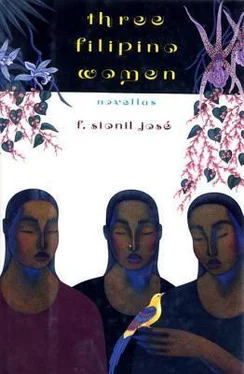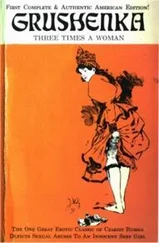Francisco Jose - Three Filipino Women
Здесь есть возможность читать онлайн «Francisco Jose - Three Filipino Women» весь текст электронной книги совершенно бесплатно (целиком полную версию без сокращений). В некоторых случаях можно слушать аудио, скачать через торрент в формате fb2 и присутствует краткое содержание. Год выпуска: 2013, ISBN: 2013, Издательство: Random House Publishing Group, Жанр: Современная проза, на английском языке. Описание произведения, (предисловие) а так же отзывы посетителей доступны на портале библиотеки ЛибКат.
- Название:Three Filipino Women
- Автор:
- Издательство:Random House Publishing Group
- Жанр:
- Год:2013
- ISBN:978-0-307-83028-9
- Рейтинг книги:4 / 5. Голосов: 1
-
Избранное:Добавить в избранное
- Отзывы:
-
Ваша оценка:
- 80
- 1
- 2
- 3
- 4
- 5
Three Filipino Women: краткое содержание, описание и аннотация
Предлагаем к чтению аннотацию, описание, краткое содержание или предисловие (зависит от того, что написал сам автор книги «Three Filipino Women»). Если вы не нашли необходимую информацию о книге — напишите в комментариях, мы постараемся отыскать её.
and
-examine the Philippine experience through the lives of three female characters, a prostitute, a student activist, and a politician.
Three Filipino Women — читать онлайн бесплатно полную книгу (весь текст) целиком
Ниже представлен текст книги, разбитый по страницам. Система сохранения места последней прочитанной страницы, позволяет с удобством читать онлайн бесплатно книгу «Three Filipino Women», без необходимости каждый раз заново искать на чём Вы остановились. Поставьте закладку, и сможете в любой момент перейти на страницу, на которой закончили чтение.
Интервал:
Закладка:
We did not stay with them; she led me out to one of the houses by the chapel, across an alley heaped with cooking pots, stacked firewood, and empty chicken coops. The whole place smelled of sweat and tired people. In the dim, almost sepulchral living room, a corpulent woman was stretched on an iron bed stacked with pillows that needed washing, her hair grayish and stringy. When she saw Malu, she half rose and grinned, baring a set of bad teeth stained with betel nut. Malu greeted her politely. She was the priestess, the leader of the congregation.
Dusk was now upon us. Back in the chapel, a single fluorescent tube in the nave was on and several candles in the altar with the image of Christ were lighted. They were all within the enclosure now. I sat just outside on one of the benches by the railing. They started with the national anthem, not the anthem sung in the schools with its exotic Tagalog. The melody was the same, but the words were simpler, more beautiful. The woman whom we had met in the house intoned a prayer first and all the members, not more than fifty and mostly women, stood silently. They were working-class people; their clothes were shabby, and their skins were dark with sun and toil. Now, their eyes closed, they started praying, Malu with them. After a while, many started to sway and tremble; the fat woman walked around, stood before each member, praying. I was transfixed, watching Malu. She had closed her eyes and her arms started to quiver. Each one spoke, not in unison but singly, in a Tagalog I could hardly understand, not the Tagalog of the sidewalk but the Tagalog of the poets. They thanked God and promised they would work for His glory. Then it was Malu’s turn — the priestess was in front of her. Malu was in a deep trance and, perhaps, did not know what she was saying. Her voice was resonant, and her Tagalog was beautiful and frightening and I feared for her, for she said, “Dear God, Your poor and Your weak — Who will help them? When You said You gave us not peace but the sword, where now is the sword so that we may bring justice to Your people?”
For all her radical verbiage, Malu was not one to carry arms; she was scared of them and of military men. Her threshold for physical pain was low. She once suffered through a horrible toothache because she felt it was more torture to sit on a dentist’s chair. Her childhood memories of her visit to one were indelible — the drill, it had seemed to her then, was going right through her tooth, into her being. I accompanied her to my dentist who was an excellent and understanding woman with a calm, soothing manner. Still, she paled visibly with the first shot of Novocain in her gums.
“How can you be a revolutionary when you cannot even visit a dentist without trembling? How will it be then when you get shot at? Or when you see blood?”
“You are no different — you’re just like all of them,” she said. “Did it over occur to you that revolution is not just shooting and dying? It is also cooking, typing, keeping files, planning, teaching — and organizing.”
I knew she was doing a lot of this and during the Christmas break that year, I saw her less, but I phoned every day. She was busy in the slums, worried that those driftwood houses would soon be bulldozed by the government.
“It is for the greater good, Plat,” I said. “That place was meant for harbor facilities, for storehouses.”
“But there is no place where they can be relocated,” she said angrily. “And more than that, the government will not start any construction for two years. I know, I researched it.”
I could not argue. Perhaps, I was just being jealous of Charlie who was now with her every day. I knew the slum needed not just simple housing but sewage disposal, garbage collection and a water system. Burned into my mind was that afternoon we went there, the pigpens that passed for homes, the unmistakable imprint of harsh living in the mottled skins of people, the big bellies of children, the rancid smell of rotting garbage and human waste in the alleys.
“I think you are in love with Charlie,” I blurted out.
“Don’t be funny,” she retorted, and banged the phone.
I visited her on Christmas day — her mother had called and said I should have lunch with them and she hinted that Malu needed to see me.
It was a memorable day. I brought this engagement ring hoping it would make her happy. It was not much, a simple.32 carat diamond in white gold setting. It was also a bleak day and I did not give her the ring though she gave me a gold-filled ball pen. I couldn’t give the ring because for the first time, I saw her cry, the tears just welling in her eyes and down her cheeks.
We were out in the garden by ourselves, under the golden shower pergola. I held her, tried to comfort her. Charlie was dead; they had buried him that morning.
“He had so much promise,” she said. He was going back to school so that someday he would be a lawyer and would know how to fight for the “little people” who had no defense; they knew neither the law nor big men.
They were already bulldozing the settlement. The slum dwellers had organized a picket line and Charlie was a leader in the picket. He had left the line to plead with the Metrocom who had now brought the bulldozers. He did not even taunt them. He merely left the line to tell them that all of them, soldiers and squatters alike, were “little people.” They shot him instead.
“I ran to him and they would have shot me, too” Malu said, “had the others not rushed with me to the fallen boy.”
I was now busy with exams and term papers, but I religiously went to the acacia at noon. Sometimes she joined me, though briefly. At one time, she said she was going to India just to be alone. I remember witnessing a Hindu festival in Singapore: men paraded in the streets, their tongues, their cheeks punctured with long thick needles. A bearded man pulled a cart with ropes fastened to his back muscles by iron hooks. There was no blood and my eyes were not fooling me. It was self-hypnosis again, of this I was sure. Now, serious doubts crowded my mind and I worried about Malu coming back, garbed in saffron and chanting on street corners.
It was during the small graduation dinner Mother gave that I presented the ring to her, told her not to open the package till she got home. That same evening, she called and said she would give it back. I asked why and she said she wanted to be fair with me. She said, “Truly, I love you.”
A warm and glorious glow engulfed me. It was the first time she uttered it. Why then give the ring back? I could not understand. How could I compete with something I could not vanquish, least of all touch?
“There is this cause,” these were her exact words, “that will take most of my time, my energies, my precious Teng-ga.”
Malu disappeared during the two-month school vacation and frightened her parents and me. Her mother often called to find out if she had gotten in touch. She had gone to the province, she had told her mother, for another of those teach-ins. She would be away for just a couple of weeks, but on the third, when she did not return, we started looking. She had said she would go again to Bicol; I hastily called Uncle Bert, but neither she nor her group was there. I did not inquire of the army or the constabulary — they were the last people to ask about Malu.
By then, too, I had taken on more responsibilities in our business. I had a desk in Operations and Planning. Mother and my older brothers had thought it best to let me work for a couple of years before going to Wharton for an MBA. It was just as well. I could not concentrate, I brooded over the times Malu and I shared, the conversations and, most of all, that evening in a motel when we held hands and dreamed.
She returned in the first week of June, shortly before classes began. It was her mother who told me she was back. I asked to talk with Malu. Her mother suddenly seemed ill at ease, as if Malu was beside her telling her to say she was not in, for that was what her mother said. I went to her house immediately and was told by the maid who opened the door — she did not let me in — that Malu was still out.
Читать дальшеИнтервал:
Закладка:
Похожие книги на «Three Filipino Women»
Представляем Вашему вниманию похожие книги на «Three Filipino Women» списком для выбора. Мы отобрали схожую по названию и смыслу литературу в надежде предоставить читателям больше вариантов отыскать новые, интересные, ещё непрочитанные произведения.
Обсуждение, отзывы о книге «Three Filipino Women» и просто собственные мнения читателей. Оставьте ваши комментарии, напишите, что Вы думаете о произведении, его смысле или главных героях. Укажите что конкретно понравилось, а что нет, и почему Вы так считаете.












